Is it okay to show affection in public? The answer really depends on where you are. Public Displays of Affection can mean a quick hug or a kiss on the cheek. Some places treat these moments very differently:
- In India and Nigeria, people often face harsh reactions for showing affection in public. Sometimes, this can even lead to trouble at school.
- In Mexico, many see PDA as a normal part of life, but older and younger people might feel differently.
You might wonder why something so simple can cause such strong feelings. Maybe you have felt awkward seeing a couple hug in a park or wondered if you should hold hands in public.
Key Takeaways
- Public Displays of Affection (PDA) are different in each culture. What is okay in one country may not be okay in another.
- Simple acts like holding hands or hugging can help your relationship. These actions can make you feel closer to each other.
- Think about where you are before you show affection. Watch how people act to know what is fine to do.
- Talk with your partner about how you feel about PDA. Respect each other’s limits to build trust.
- Learn about local rules and customs for PDA. Some places have strict laws that can cause problems.
Public Displays of Affection
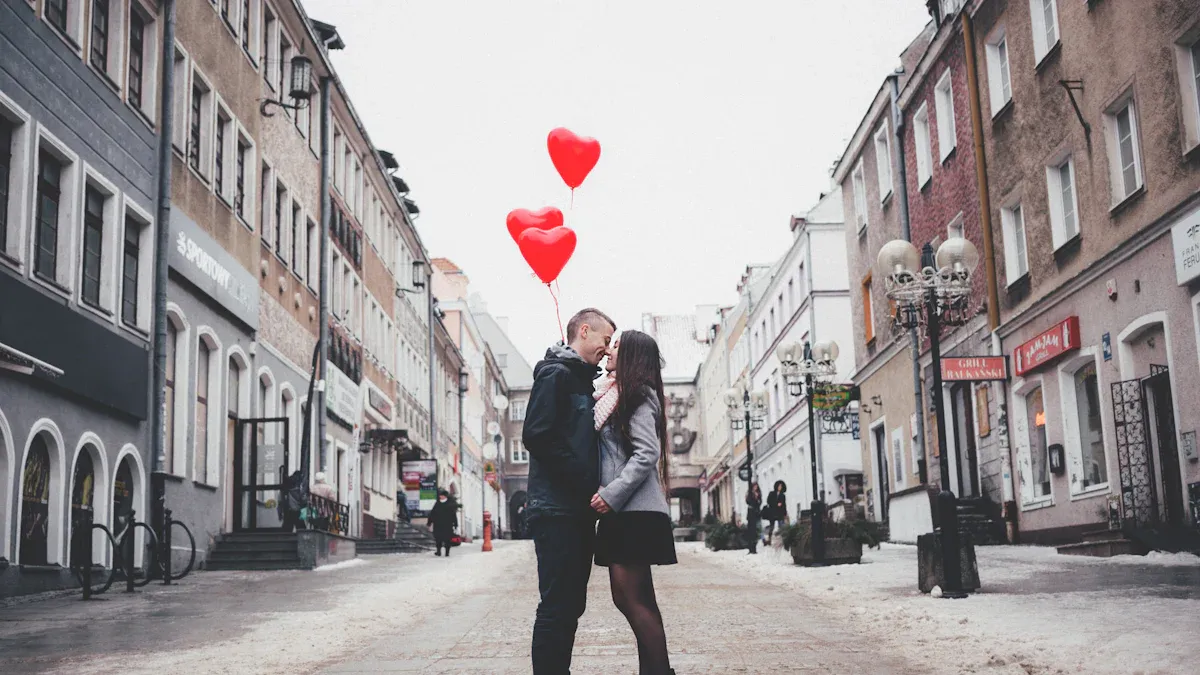
Types of PDA
You see people show affection in many ways. Public Displays of Affection are acts couples do that others can see. These acts can be small or big. People notice them in lots of places.
Here are some common types you might see:
- Holding hands with your partner
- Kissing on the lips, cheek, forehead, neck, or hand
- Hugging, holding, or cuddling
- Touching or stroking each other
- Playing with fingers or hair
- Massaging shoulders, back, hands, or feet
- Putting your arm around someone’s waist or shoulder
- Feeding your partner a bite of food
- Holding each other close while dancing
- Sitting on your partner’s lap
- Whispering in their ear
- Gazing into each other’s eyes
- Winking or blowing a kiss
- Saying “I love you” or giving compliments
Tip: What seems normal to you might feel strange to others. Always look at where you are and who is nearby.
Not every type of PDA gets the same reaction. Some are mild and most people are okay with them. Others are more private and can make people feel awkward. Check out this table to see how cultures view these actions:
| Type of PDA | Description | Cultural Acceptance |
|---|---|---|
| Mild Displays | Holding hands, hugging | Usually accepted in most cultures |
| Moderate Displays | Kissing, light touching | Changes a lot by culture |
| Intimate Displays | Groping, passionate kissing | Often not liked in public places |
You might see that what is fine in one place is not fine in another. Even in the same city, people have different ideas about what is too much.
Everyday Examples
You see Public Displays of Affection almost everywhere. Some gestures are so common you might not notice them. Others stand out and make people look.
Here are some everyday examples you might see:
| Type of Gesture | Examples |
|---|---|
| Small Gestures | Holding hands, hugging, pecking cheeks, kissing foreheads, gripping shoulders |
| Explicit Gestures | Making out, groping, doing sensual things in public |
You might see couples holding hands while walking in the park. Some people hug or give a quick kiss on the cheek when they meet. In parks, couples often feel relaxed and show more affection. At school, teachers ask students to keep things professional and not show PDA. In workplaces, most people think showing too much affection is not okay.
- In parks, couples may show affection openly.
- In schools, PDAs are discouraged so students focus on learning.
- In workplaces, showing lots of affection can seem wrong.
Media also affects how you think about Public Displays of Affection. Movies and TV shows often show couples kissing or hugging in public. These scenes can make you think some behaviors are normal, even if your community disagrees. Some couples, like interracial or same-sex couples, might not show PDA because they worry about bad reactions. News stories sometimes talk about risks, especially for LGBTQ people, who can face bullying or even violence for showing affection in public.
Attitudes about PDA have changed over time. People are more accepting now, especially as they see more types of couples. Still, not everyone feels safe or okay showing affection in public. You might notice that some couples, like same-sex or interracial couples, show less PDA because of social barriers.
Note: Always think about your surroundings and how your actions affect others. Respecting others helps everyone feel comfortable.
Relationship Benefits
Emotional Bonding
Showing affection in public is more than holding hands. It helps you and your partner feel closer. Experts say small acts, like a kiss or gentle touch, help you connect. These moments show your partner you care, even with others around.
Studies from Indonesia, Nepal, and Poland found couples who show affection in public feel happier. This happens in many cultures, not just a few. Showing love openly helps your relationship get stronger.
Here are some emotional benefits experts found:
| Emotional Benefit | Description |
|---|---|
| Develops Intimacy | You show your bond and interest, making your relationship feel special. |
| Improves Bonding | Touch increases oxytocin, the “love hormone,” which helps you feel connected. |
| Reduces Stress | Hugs and touches lower stress, making you feel safe and cared for. |
| Breaks Taboos | You show that your relationship matters more than what others think. |
| Your Partner Feels Desired | Your partner feels wanted and important when you show affection in public. |
| Shows Your Comfort Level | You both feel comfortable and ready to move forward together. |
Tip: Even small acts, like holding hands, can help you feel closer.
Security and Trust
Showing affection in public helps you feel safe in your relationship. When you show love in front of others, you say, “We are together.” This can help you and your partner trust each other more.
When you feel safe, you worry less about what people think. You know your partner supports you. Trust grows with every smile, hug, or gentle touch in public. These moments help you both feel confident and important.
Remember: Feeling safe and trusted starts with small, caring actions you share every day.
Social Discomfort
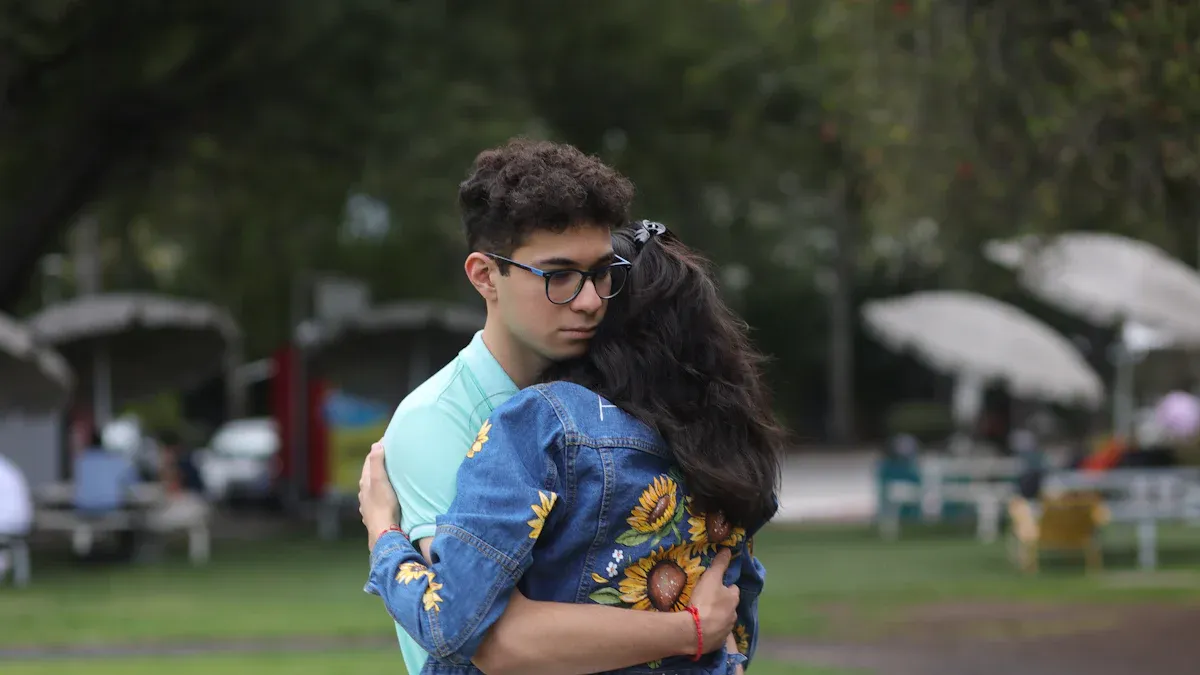
Observer Reactions
When you see couples show affection in public, you might feel many things. People do not all react the same way. Some people smile and feel happy for the couple. Others feel awkward or even upset. Here are some reactions you might notice:
- Jealousy: You may wish you had a bond like theirs.
- Desire for a relationship: Watching couples can make you want a partner.
- Feelings of loneliness: Seeing affection can make you feel left out.
- Perception of attention-seeking: Sometimes, you think the couple wants to be noticed.
- Skepticism about authenticity: You may wonder if the couple is only showing their best side.
Note: Your feelings are normal. Many people have mixed reactions to Public Displays of Affection.
Boundaries
Every community has rules about what is okay in public. These rules, called social norms, decide how much affection you can show. Some places allow holding hands or hugging. Other places think even small gestures are too much.
- In some cultures, people do not like PDA, but others accept it.
- In the U.S., you usually see more acceptance, but it depends on the place.
- Some couples use PDA to challenge strict rules.
Here is a quick look at how different places view PDA:
| Community/Culture | Acceptance of PDA | Notes |
|---|---|---|
| United States | Generally accepted | Changes by context and situation |
| China | Considered taboo | Holding hands or kissing in public is frowned upon |
Social norms can make you unsure about what is okay. You might worry about making others uncomfortable or breaking rules. If you feel unsure, look around and see what others do. When in doubt, talk with your partner about what feels right for both of you.
Cultural Perspectives
United States
Attitudes about showing affection in public change by location. Some people like holding hands or hugging outside. Others feel awkward about it. Schools have rules against PDA. Teachers often tell students to stop hugging or kissing. Even in a free country, people argue about what is okay.
Surveys show Americans are split on PDA. About 34% support it. Around 38% do not like it. You can get different reactions in the same city or school.
| Country | Support (%) | Oppose (%) |
|---|---|---|
| United States | 34 | 38 |
| Spain | 61 | 11 |
| Sweden | 59 | 12 |
| Argentina | 45 | 16 |
| Poland | 26 | 35 |
| South Korea | 12 | 51 |
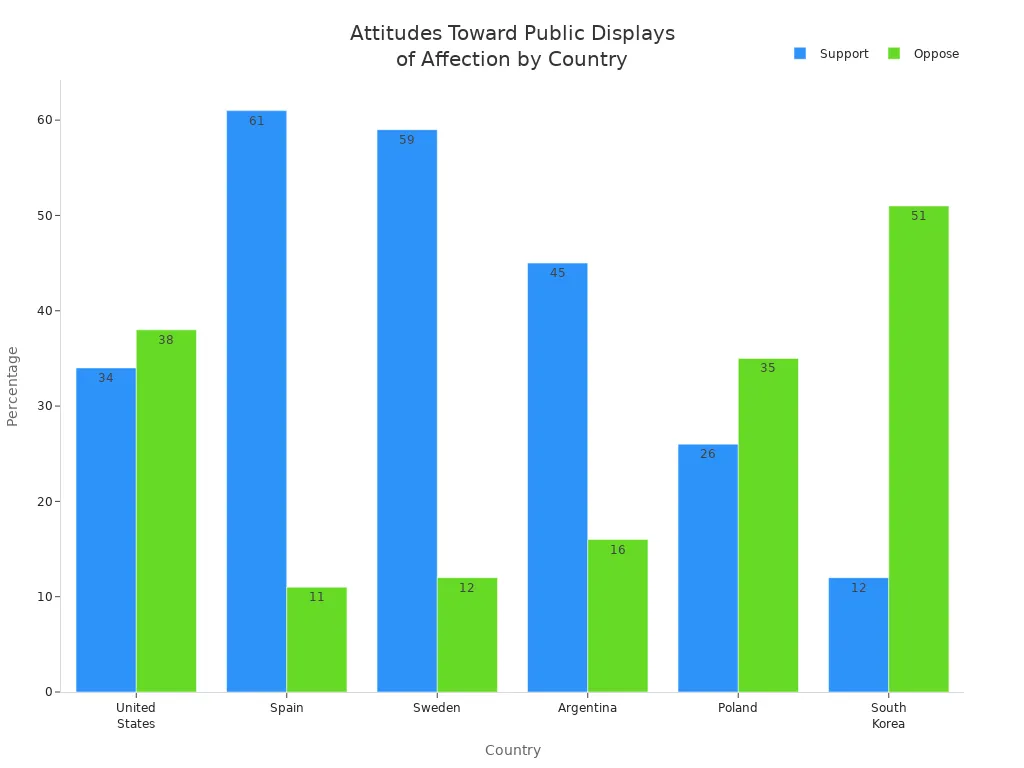
Younger people in the U.S. think PDA is normal. Older adults may feel uncomfortable about it. People in same-sex relationships feel less safe showing affection. They worry about how others will react. Some avoid holding hands or hugging outside.
Note: What feels normal to you might seem strange to someone else, even in your own town.
International Views
Traveling or watching videos shows big differences in PDA. In Spain and Sweden, couples kiss or hug in public. In Latin America, couples cuddle in parks. Some join kissing contests at festivals.
Some countries have strict rules. In the Middle East, public kissing can mean arrest. In India, police can fine or arrest you for “obscene acts.” In Indonesia’s Aceh province, couples risk public floggings. In Vietnam, people dislike PDA outside big cities. LGBTQ+ couples face tougher rules where their relationships are not legal.
- In Europe, especially Italy and Spain, PDA is common and seen as romantic.
- In Canada, people accept mild gestures, but passionate kissing might get stares.
- In China and Korea, couples often match outfits instead of holding hands.
- In Buddhist Southeast Asia, people value modesty and avoid PDA.
| Age Group | Attitude Towards PDA |
|---|---|
| Younger Individuals | View PDA as a natural expression of relationships |
| Older Adults | Tend to be more conservative in public displays |
Tip: Always check local customs before showing affection in public. What is sweet in one country could cause problems in another.
Public Displays of Affection mean different things around the world. Some places celebrate it. Others have strict limits. Knowing the rules helps you show respect wherever you go.
Navigating PDA
Social Context
You might wonder how to know if showing affection in public is okay. The answer often depends on where you are and who is around. Every place has its own rules and feelings about Public Displays of Affection. Some places welcome a quick hug or holding hands. Other places see even small gestures as too much.
Here are some tips to help you read the room:
- Look around and notice how others act. If no one else is showing affection, it might be best to wait.
- Think about the setting. Parks and concerts often feel more relaxed. Schools, offices, or religious places usually expect you to keep things private.
- Remember that different cultures have different rules. In some countries, you could get in trouble for kissing in public.
- Pay attention to the people nearby. If you see families with children or older adults, they might feel uncomfortable with certain gestures.
- Always respect local laws and customs. Some places have strict rules, and breaking them can lead to problems.
Tip: When in doubt, keep things simple. A smile or gentle touch can show you care without crossing any lines.
Partner Communication
Talking with your partner about comfort levels makes a big difference. You both might feel differently about showing affection in public. Open and honest conversations help you find what works for both of you.
Try these strategies:
- Share your feelings about PDA. Let your partner know what feels right for you.
- Ask your partner how they feel about holding hands, hugging, or kissing in public.
- Watch for body language. If your partner seems tense or pulls away, check in with them.
- Set clear boundaries together. Decide what you both feel comfortable doing in public.
- Respect each other’s wishes. If one of you feels unsure, it’s okay to take a step back.
- Always ask for consent before showing affection, especially in new places.
Remember: Good communication builds trust and helps you both feel safe and respected.
You know that Public Displays of Affection help couples feel close. They can make people happier and show care for each other. But sometimes, these actions make others feel awkward. People from different places may see things in their own way. To keep things comfortable, try these ideas:
- Find out about local customs before you show affection.
- Make rules that work for you and your partner.
- Talk about what feels okay and listen to each other.
Keep in mind, everyone’s experience is different. You can show love and still respect people and the place you are in.
FAQ
What counts as a public display of affection?
You show PDA when you hug, kiss, or hold hands with your partner where others can see you. Even a quick touch or a loving look can count as PDA.
Can PDA get you in trouble?
Yes, sometimes. Some schools, workplaces, or countries have strict rules. You could get a warning or even a fine. Always check the rules before you show affection in public.
Why do some people dislike PDA?
Some people feel uncomfortable when they see couples being affectionate. They might think it is too private or not polite. Culture, age, and personal beliefs all play a part.
How can you know if PDA is okay?
Tip: Look around and see what others do. If no one else is showing affection, it might be best to wait. When unsure, ask your partner and respect local customs.

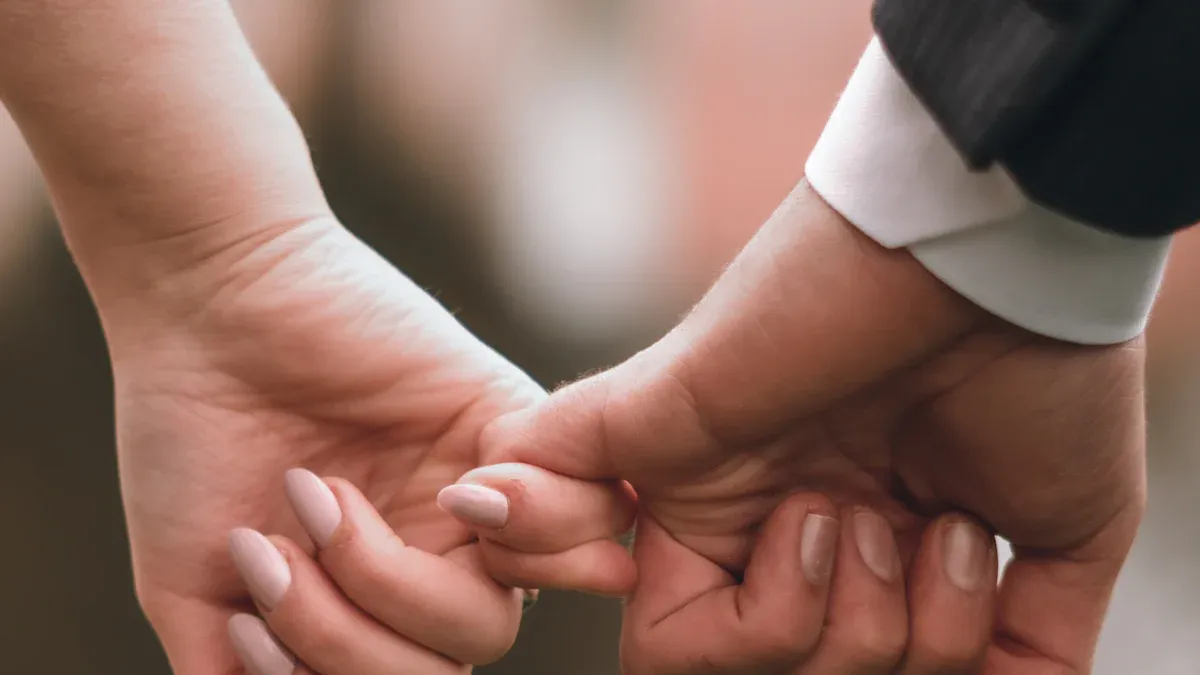

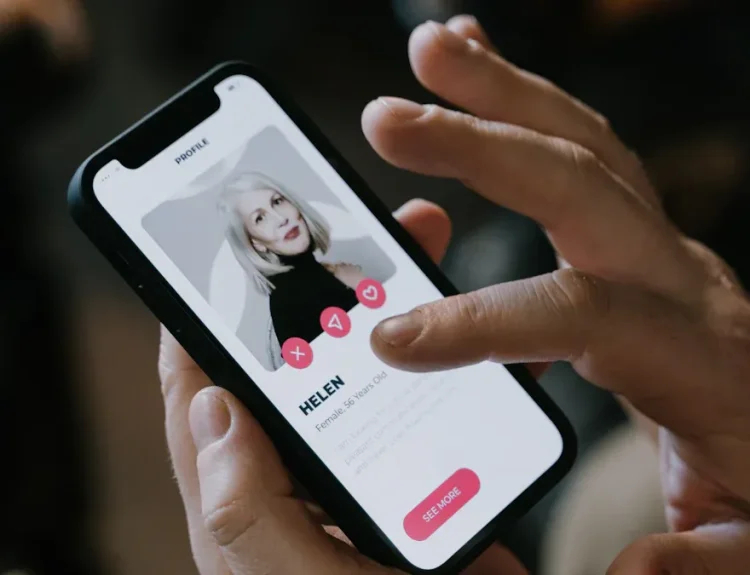






[…] Public Displays of Affection […]
[…] Public Displays of Affection […]